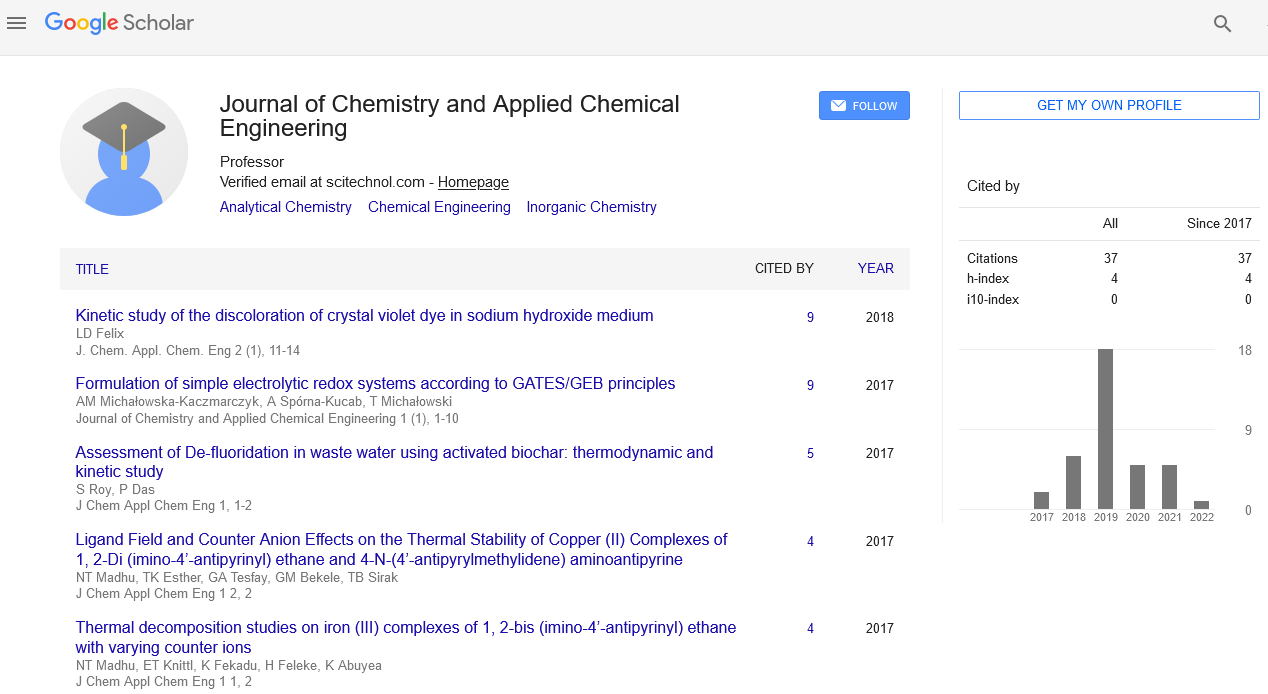Opinion Article, J Chem Appl Chem Eng Vol: 7 Issue: 3
Advancements in Synthetic Procedures for Enhancing Raw Material Transformation
Eril Weinginer*
1Department of Materials & Environment, Delft University of Technology, Delft, The Netherlands
*Corresponding Author: Eril Weinginer,
Department of Materials & Environment,
Delft University of Technology, Delft, The Netherlands
E-mail: erilwein_giner@gmail.com
Received date: 30 August, 2023, Manuscript No. JCACE-23-116789;
Editor assigned date: 01 September, 2023, Pre QC No. JCACE-23-116789 (PQ);
Reviewed date: 15 September, 2023, QC No. JCACE-23-116789;
Revised date: 22 September, 2023, Manuscript No. JCACE-23-116789 (R);
Published date: 29 September, 2023, DOI: 10.4172/Jcace.1000032
Citation: Weinginer E (2023) Advancements in Synthetic Procedures for Enhancing Raw Material Transformation. J Chem Appl Chem Engl 7:3.
Description
In the world of chemistry, the transformation of raw materials into valuable products is a fundamental and continuous process. These raw materials can range from fossil fuels and minerals to agricultural products and waste materials. The synthetic procedures used to convert these raw materials into useful compounds have undergone significant improvements in recent years. These advancements are driven by the need to create more sustainable and efficient processes, reduce waste, and enhance the production of essential materials for various industries. One of the most notable improvements in synthetic procedures is the adoption of green chemistry principles. Green chemistry aims to design processes that minimize the use and generation of hazardous substances, reduce energy consumption, and increase resource efficiency. This approach has led to the development of more environmentally friendly methods for transforming raw materials. For instance, the use of ionic liquids as green solvents has gained prominence. These solvents are non-volatile and can be recycled, reducing the environmental impact of the chemical processes. Additionally, catalysts that promote selective and sustainable reactions have been developed, reducing the need for harsh reagents and by-products.
Continuous flow chemistry
Traditional batch processes for chemical transformations have been replaced or complemented by continuous flow chemistry. In these systems, reactants are continuously fed into a reactor, allowing for more precise control over reaction conditions and shorter residence times. This result in higher product yields, reduced waste, and enhanced safety. Continuous flow systems are particularly useful for scaling up production and have been applied in various industries, including pharmaceuticals, petrochemicals, and agrochemicals. They are also versatile, enabling a wide range of reactions, from catalytic hydrogenations to multi-step syntheses.
Biocatalysis and enzyme engineering
Biocatalysis, which involves the use of enzymes as catalysts, has become a powerful tool for transforming raw materials into valuable products. Enzymes are highly selective, work under mild conditions, and can be produced from renewable resources. Recent advancements in enzyme engineering have expanded the scope of biocatalysis, allowing for the development of tailor-made enzymes for specific reactions.
Nanotechnology and materials science
Nanotechnology has had a profound impact on the transformation of raw materials. Nanomaterials, such as nanoparticles and nanocatalysts, have shown great potential in improving reaction rates and selectivity. These materials have a high surface area and can enhance the catalytic properties of traditional catalysts. Moreover, advances in materials science have led to the development of novel materials that can be used as raw materials in various industries. For instance, the use of graphene and carbon nanotubes in electronics and composites has revolutionized the materials landscape.
Artificial intelligence and machine learning
The integration of Artificial Intelligence (AI) and machine learning into the field of synthetic chemistry has revolutionized the way raw materials are transformed. AI algorithms can predict reaction outcomes, optimize reaction conditions, and suggest novel chemical pathways. This has significantly accelerated the process of discovering and developing new synthetic procedures. Through machine learning, chemists can analyze vast datasets and make data-driven decisions, leading to more efficient and sustainable processes. AI-driven drug discovery, for example, has the potential to speed up the development of pharmaceuticals and reduce their cost.
Conclusion
Advancements in synthetic procedures for changing crude materials have ushered in a new era of sustainability, efficiency, and innovation. The adoption of green chemistry principles, continuous flow systems, biocatalysis, nanotechnology, and artificial intelligence has transformed the landscape of chemical manufacturing. These developments are not only improving the efficiency of raw material transformation but also making it more environmentally friendly and economically viable. As the world faces increasing environmental challenges and resource constraints, these advances are essential in ensuring a sustainable future for the chemical industry and beyond.
 Spanish
Spanish  Chinese
Chinese  Russian
Russian  German
German  French
French  Japanese
Japanese  Portuguese
Portuguese  Hindi
Hindi 